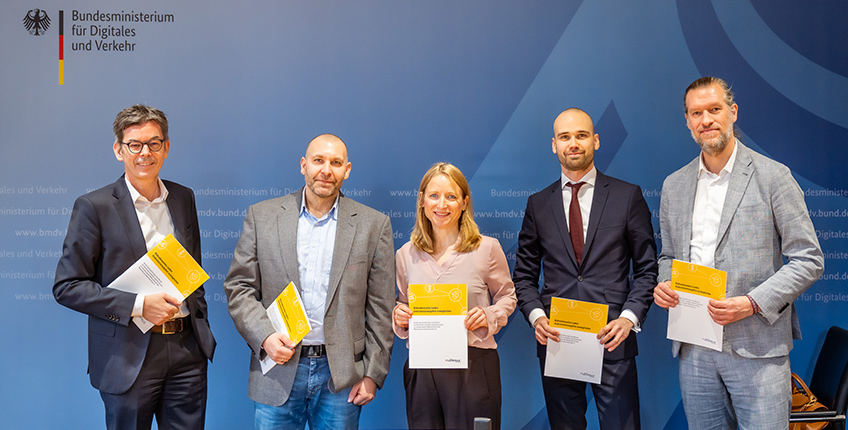Advisory Board of the National Centre for Charging Infrastructure presents recommendations for action at the BMDV.
Today at the Federal Ministry for Digital and Transport (BMDV), the Advisory Board of the National Centre for Charging Infrastructure [at NOW GmbH] presented a roadmap for introducing bidirectional charging in Germany. Leading members of the advisory board as well as representatives of the National Centre presented the paper to Daniela Kluckert, Parliamentary State Secretary, also Commissioner for charging column infrastructure, at the BMDV. Around 50 experts from industry and relevant stakeholders developed the paper together, under the leadership of EnBW and VDA.
In order to accelerate the energy transition, the federal government formulated the goal set out in the coalition agreement as well as in measure 47 of the Charging infrastructure II masterplan – namely, to introduce bidirectional charging nationwide and facilitate it in a non-discriminatory manner. Based on an analysis of the status quo and possible use cases such as vehicle-to-home (V2H) and vehicle-to-grid (V2G), the paper presented today contains a roadmap with concrete recommendations for action:
- The advisory board anticipates the first market-ready V2H applications from 2025, the first V2G applications are expected to come onto the market somewhat later. From 2028, there may be a ramp-up in interoperable and standardised solutions for V2H and V2G, provided that the relevant standards are determined by then and the necessary regulatory and technical course has been set.
⠀ - From a technical perspective, plug & play solutions are the objective. Standardisations in the area of electrical safety, grid connection, digital communication as well as measurement and control applications are particularly required to achieve this. The advisory board deems it necessary to fully eliminate the existing obstacles and disadvantages in the current legal framework for electricity storage and electricity fed back into the grid. This concerns the obligation to pay fees, levies and surcharges. The advisory board recommends here the creation of an overarching legal framework.
⠀ - In terms of ‘data availability from the vehicle’, there has been an absence of standardised rules throughout Europe as to how users access their data and how they can make it available to aggregators and service providers. Parallel to this, the internationally applicable technical standards must be successively further developed.
Based on these results, the BMDV will work together with partners both within and outside the federal government to exploit the untapped potential of electric mobility for citizens as well as for the entire energy system.
Daniela Kluckert, Parliamentary State Secretary for Charging Infrastructure in the Federal Ministry for Digital and Transport (BMDV): “Bidirectional charging will be an attractive additional offer for users of electric cars: your own car becomes a vehicle for energy storage – initially for consumption in your own home and in future, for feeding electricity back into the electrical grid. This helps to reduce electricity costs and at the same time, makes our electricity grid more stable. That is why it’s so important that we utilise all potential and opportunities. The expert committee’s roadmap is a good starting point from which to make bidirectional charging into an established force in the energy system of the future.”
Johannes Pallasch, spokesperson for the National Centre for Charging Infrastructure and Head of Division at NOW GmbH: “Bidirectional charging not only offers users additional options, but also contributes to making the energy supply more flexible. In order to fully exploit this potential and make it accessible to all, we must eliminate the existing hurdles. The roadmap shows us how we can achieve marketable solutions in Germany by 2028 and turn this vision into reality. We are delighted that further implementation will be pursued on this basis.”
Recommendations for action from the advisory board (PDF)
Photo credit: Franz Josef, Berlin


